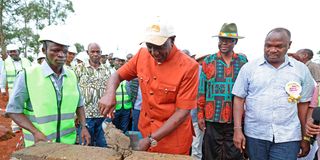Premium
Parliament to defy court order, hold hearings on Affordable Housing Bill

Jua Kali sector workers demonstrate outside Parliament Buildings in Nairobi on December 28 in support of the Housing Levy.
Parliament is next week set to embark on public hearings for the Affordable Housing Bill, 2023, which seeks to provide a comprehensive legal framework for the implementation of the government’s housing plan.
The public hearings shall be held jointly by the National Assembly’s Finance and Housing, Urban and Public Works committees despite a court order stopping the exercise.
According to the order issued by the High Court in Kisumu on December 19, 2023, Parliament is barred from undertaking public hearings across the country on the Bill
Also Read: State moves to widen housing levy net

President William Ruto inspecting the ongoing affordable housing project in Kibera Highrise, Langata Constituency in Nairobi on November 22, 2023.
“…in the interim, conservatory order be and is hereby issued to prohibit the conduct of public participation in the manner prescribed on 9th December, 2023 in the local daily newspapers until the application is heard inter-parties” reads the order.
However, according to Majority Leader Kimani Ichung’wah, the conservatory orders issued by the High Court only apply in the manner indicated in the public participation notice issued on December 9,2023 by Parliament, which is submission of memoranda.
“The orders did not prohibit Parliament from conducting any other form of public participation, including undertaking public hearings across various parts of Kenya on the Bill, or the ordinary stakeholder engagements with key sectors, experts, workers, employers, informal sector, political parties, civil society and marginalized communities,” Mr Ichung’wah said.
He added that the orders are a stumbling block to Parliament and the Executive complying with another order issued by a three-judge bench on the Affordable Housing Levy as provided for in the Finance Act.
“The High Court held that the affordable housing framework requires a comprehensive legal framework and hence the introduction of the Affordable Housing Bill,2023 to comply with the judgement of the distinguished judges of the High Court as issued in November last year,” Mr Iching’wah said.
A statement from Parliament indicates that the holding of public hearings across the country by the joint committee on the Bill is the constitutional obligation of the House to facilitate public participation in its legislative business.
Article 118 of the Constitution mandates and obligates Parliament to facilitate public participation and involvement in its legislative work.
The public hearings by the two committees is expected to be concluded by the end of this month and a report tabled before the House for debate when MPs resume sittings in February.

President William Ruto (centre) during the launch of Mabera Affordable Housing Project in Migori County.
The Affordable Housing Bill, 2023 which has already undergone First Reading, came to the floor of the House last year following a High Court Order that declared the housing levy imposed only on employees in the formal sector unconstitutional and unfair. The government sponsored Bill seeks to cure this.
In its judgment, the court pointed out that targeting persons in formal employment and leaving out those in the informal sector is discriminatory.
The Bill states that an employer shall deduct 1.5 per cent from their employees’ monthly gross pay and remit it to the fund. The employer is required to match the amount.
“There is an imposed levy known as the affordable housing levy. The levy shall be at the rate of 1.5 per cent of gross salary of an employee or the gross income of a person received or accrued,” reads the Bill. “The levy shall be payable to the collector for remittance into the fund not later than the ninth working day after the end of the month in which the gross salary was due or gross income was received or accrued.”
According to the Bill, an employer who defaults on the payment shall pay a fine of 3 per cent of the unpaid amount.
In the current financial year, a total of Sh73 billion has been set aside by Parliament to help the government realise its promise of constructing 200,000 affordable housing annually, which was in its manifesto.





